Retro: The Sheffield miner turned poet who was decades ahead of his time
and live on Freeview channel 276
Tom Hague’s work was first published in 1976 when racism and discrimination were commonplace. Not him.
“He wrote about racial equality, workers rights, responsibility, fairness in working conditions and health and safety,” says his grandson Russell Hague, who with his cousin Sharon Hall, hope to get Tom’s complete works published.
Advertisement
Hide AdAdvertisement
Hide Ad“He based his values on common decency,” Sharon adds. “Same sex relationships were acceptable and he would articulate it.”
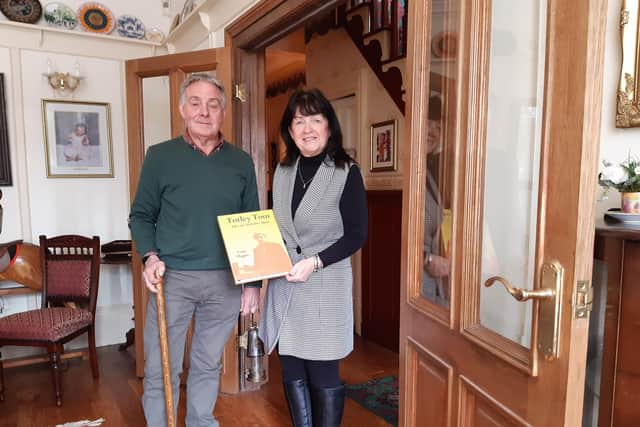

The foreword to Totley Tom Tales of a Yorkshire Miner sums it up well: “These are stories told around the fire: the poems recited with glee after a pint or two. But behind each of them there lies a far deeper truth.”
So who is this remarkable man? Born on Boxing Day in 1915, Tom had a difficult start in life. His father was killed in World War One and when his mother remarried, he was brought up by an aunt in the slum clearance area at the bottom of Ecclesall Road where Waitrose now is.
He left school at 14 and started work as a milkman. Nothing was going to come easy to this man, but his voracious appetite for books marked him apart.
Advertisement
Hide AdAdvertisement
Hide AdSharon says: “His thirst for learning was way ahead of his time. Had Tom been born two generations later he would have been a politician. If he had the chance, Tom could have gone to Oxford or Cambridge.”
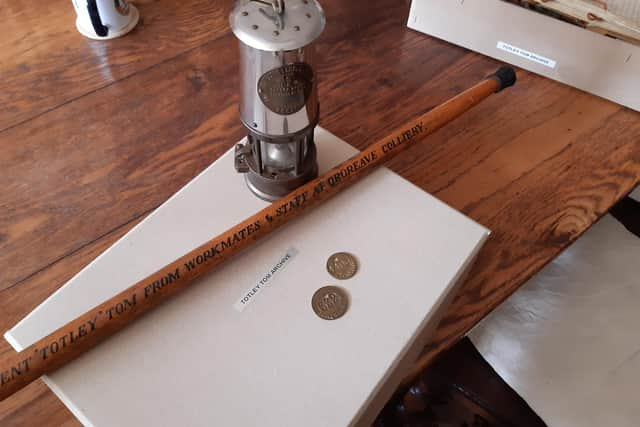

Proof of his intellect is shown when he crossed swords with Willie Whitelaw, home secretary from 1979 to 1988, who was on a Radio Sheffield talk show discussing politics.
“Grandad got on the phone and ripped him to bits,” says Russell. “After the phone-in, the Daily Mail rang him up and he was featured. He wrote to the Guardian, and had a letter in The Times.”
Sharon adds: “He had such a wide-ranging knowledge.”
His renown spread, leading to visits from soon-to-be famous unionists. Russell recalls: “Arthur Scargill used to come to our house to talk to him and pick his brain. After that, there was always a funny clicking noise on the phone, we thought it had been tapped.”
Advertisement
Hide AdAdvertisement
Hide Ad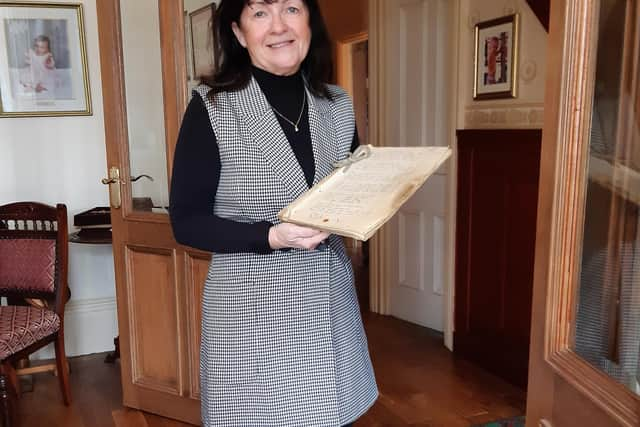

Clearly Tom was a force to be reckoned with and perhaps it was because he had worked his way up the hard way. In 1937, he married Ivy May Cheetham and they had two daughters. He was a Royal Marine in the Second World War and served in South East Asia.
In 1946 Tom became a miner, working at Barnsley Main, Barley Hall in Thorncliffe Woods and Orgreave.
Everyone called him Totley Tom because there were no other miners from the leafy suburb. When Tom left Orgreave, he was given a walking stick with an engraving.
It is called a deputy staff and Tom later used it to complete a 100-mile charity walk for Save The Children when he was in his late 60s.
Advertisement
Hide AdAdvertisement
Hide Ad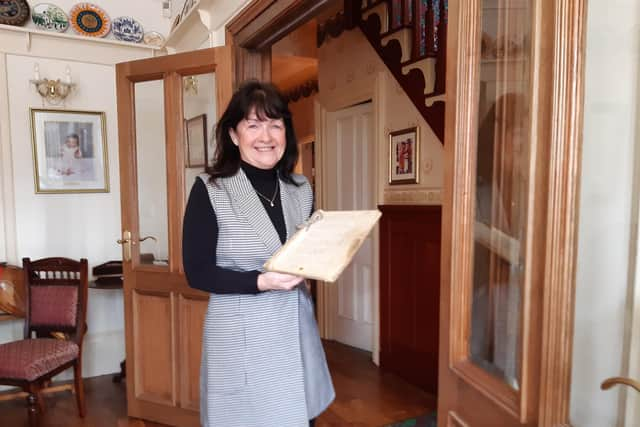

He did 30 years as a miner and retired at 62, still a faceworker and bearing the scars on his face. Sharon said: “He was very fit. He used to ride his bike to Barley Hall from Totley, which is about a 16-mile ride.
“When he came home, he would make things for my dolls.”
Russell added: “He was a father figure in my eyes.”
So how would they sum up his philosophy? “He was left wing, a member of the NUM,” says Sharon. It ran in the family. “His mother Annie was a political fighter, literally in the streets with other women.”
Tom’s writing began during the Miners Strike of 1972. Tom was a flying picket, visiting other miners to make sure the strike remained solid. “He started writing poetry during the strikes and was a prolific letter writer to The Star and Morning Telegraph,” says Russell. “He used to get people calling him a Communist. What he was doing was standing up for the working classes.
“He was clever and articulate. We bought him books for his birthday, books to read and to write in. The poetry was for his workmates.
Advertisement
Hide AdAdvertisement
Hide Ad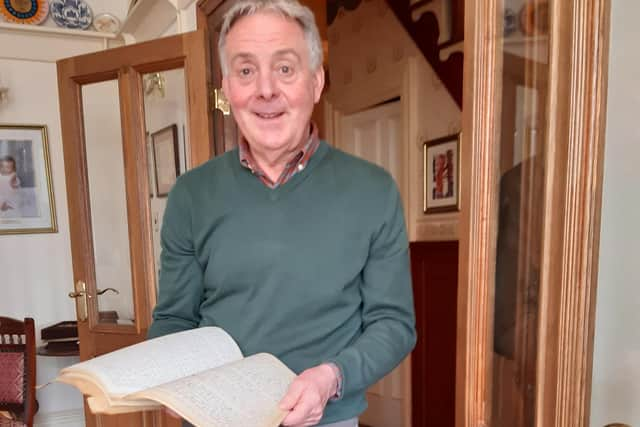

“The dialect poetry was written to preserve the dialect’s heritage, he wanted to keep it alive,” Sharon adds. “He used to say I want to show I can write proper. Properly.”
Some of his works were published in 1976 as Totley Tom: tales of a Yorkshire miner. He was aged 70. On the inside of the dust-jacket is written: “These are his stories, in prose and verse, of the place where he lives, the people he meets and the work he does”. Some of the material is in dialect.
Sheffield University took an interest after a friend of the Hague family mentioned the work to a languages professor. The Tom Hague papers are held in the university library, which includes recent recordings of interviews with family members.
“Tom was interviewed by students who used to talk to him at length about his work. One did his thesis on Tom,” says Sharon.
Advertisement
Hide AdAdvertisement
Hide AdHe went on to become something of a celebrity, writing letters to newspapers, taking part in radio phone-ins, and appearing on TV.
Tom died in 1998, at the age of 83. After his death, his relatives gathered together the pieces he’d written since his 1976 book, with the aim of publishing all his writings as one complete book.
Russell, aged 60, is a retired lecturer. Sharon is a financial advisor and both are fiercely proud of their grandad. They lived with Tom after he was given a prefab in the Sheffield suburb of Totley. The Hagues moved to Totley and the prefabs in 1945/6 when their daughter Sheila was seven and the prefabs were new.
Tom chose Totley after wife Ivy May took a tram to Beauchief, looked out over the suburb and liked what she saw. Cousins Russell and Sharon are what’s known as prefab sprouts, having grown up in housing designed to plug the post-war accommodation shortage.
Advertisement
Hide AdAdvertisement
Hide AdThey were the children of single mums who both worked, which was why Tom took them in. He remains an example to them.
Sharon says: “He was modest about Totley Tom but pleased when we went in WHSmith and saw copies of it piled high near the worlds bestsellers. But he gave away all his copies and I had to get one from eBay!
“Just before he died he asked me if we could publish the rest of his writings. So we’ve pulled together a new Totley Tom, Book One and Book Two. It features the original material and new writing. We wanted something which would last for posterity.”
Russell adds: “It is a tribute to what he achieved as a writer, a role model, an inspiration. His belief in fairness and workers rights. Sometimes he had what you might think were capitalist views, like it’s yours, you’ve earned it, but it was always about fairness.
“His poems also took the mickey out of himself.”
Advertisement
Hide AdAdvertisement
Hide AdHis influence stays with them both. Russell is now writing dialect poems and Sharon is doing an Open University degree, which Tom started. Neither can forget the sacrifices he made.
“There were six of us living on one man’s wage in the Miners Strike and we had nothing,” says Russell.
“It did him in. Any savings he had were wiped out and he never got the chance to recover. He sacrificed a lot for us.”
To contact Sharon about publishing the full collection of Tom Hague’s work, email her at [email protected].
